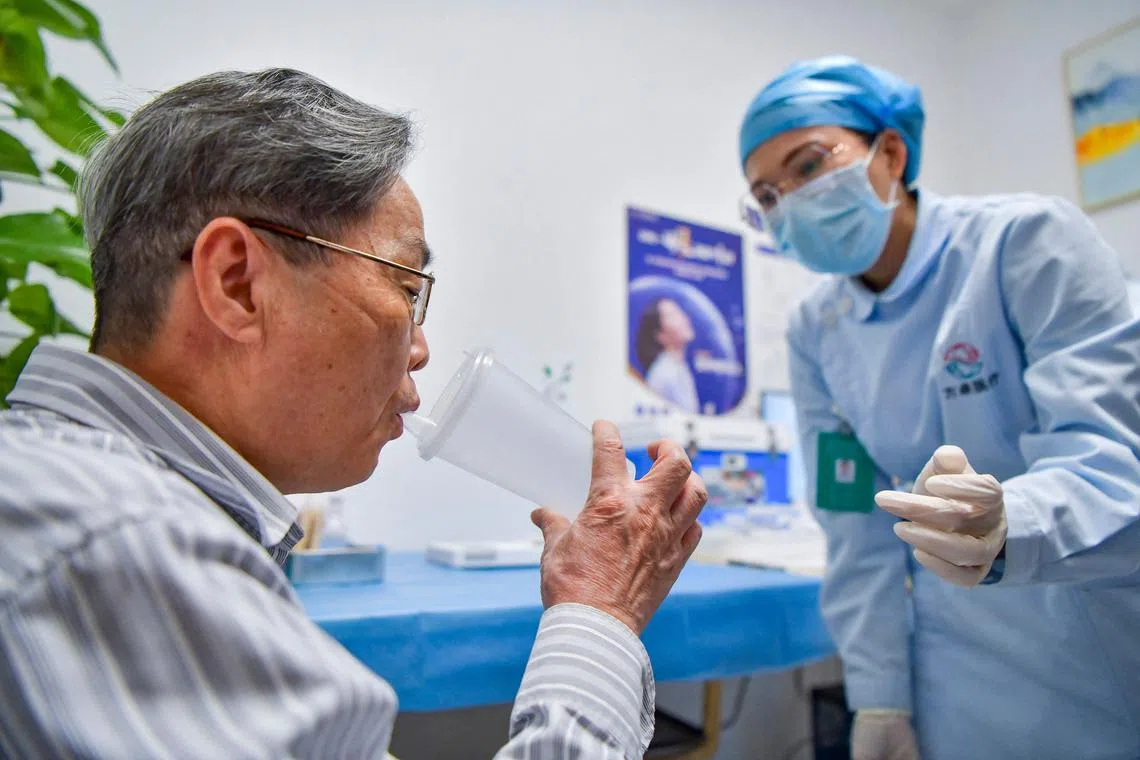China to step up vaccinating elderly
Sign up now: Get insights on Asia's fast-moving developments

A man receives a dose of inhalable Covid-19 vaccine in Haikou in China's southern Hainan province on Nov 25, 2022.
PHOTO: AFP
BEIJING - China’s health authorities say they will ramp up vaccinating the elderly against the coronavirus,
The National Health Commission will form a working group to direct efforts to inoculate those over the age of 60, including using big data to home in on them, and pushing jabs in nursing homes and activity centres for seniors.
Those who refuse to take the shot will be asked for an explanation, the top health body outlined in a work plan on Tuesday.
China has been held back from reopening because of the low vaccination rate among the elderly, the most vulnerable segment of the population.
While more than 90 per cent of its population of 1.4 billion are fully vaccinated, only 65.8 per cent of people over the age of 80 have completed the full course of jabs, and just 40 per cent have taken booster shots.
Of those aged 60 and over, 86 per cent are fully vaccinated, health officials said at a news conference on Tuesday.
China has yet to approve any mRNA vaccines and has relied on its domestically produced inactivated vaccines. It has said that abandoning its tough zero-Covid-19 policy
But faced with yet another nationwide outbreak that has stalled the economy and put millions of people in quarantine, the country has since last week seen a wave of protests across major cities calling for mass testing and lockdowns to end.
China reported 38,645 cases for Monday, a slight improvement from record levels set days before.
At the news briefing, officials attributed the recent public displays of dissent and discontent to local authorities’ overreach in keeping a lid on infection, “adding more layers on top of control measures, using a one-size-fits-all approach and ignoring the demands of the people”.
Some arbitrarily expand the scope of lockdowns and the number of people affected, prolong the lockdowns or order compounds to be sealed without approval, said Mr Cheng Youquan, director of supervision at the Centre for Disease Control and Prevention.
Local task forces have been set up to deal with this issue, he said, without mentioning the protests.
Several cities such as Beijing, Guangzhou, Chongqing and Zhengzhou, have also loosened requirements by allowing residents who stay mostly at home, such as very young children or students taking online classes, to skip mass testing.
In Guangdong province, officials said on Tuesday they would allow close contacts of Covid-19 cases to quarantine at home under certain conditions.
Capital city Beijing, which is still in a semi-lockdown with restaurants, gyms and cinemas shut and many working from home, has been building temporary quarantine facilities to cope with the thousands of positive cases a day.
On Tuesday, it said it now has 23 such facilities, known as fangcang hospitals, in operation with a total of 23,892 beds. They are now 80 per cent full.
The police in various cities have moved in quickly to quell dissent by arresting or calling up protesters for questioning.
Some who had been detained resurfaced to say they had been released, while others posted in protest chat groups asking for details of friends.
“Do friends in Shanghai have any details of Li Shujie?” read a message in a chat hosted on Telegram. “She disappeared since attending a protest at Middle Wulumuqi Road last night, is uncontactable via her mobile phone or WeChat.”
Meanwhile, a protester who was taken by police from his home in Beijing was allowed to return after giving a full account of his activities on Sunday night, his housemate told The Straits Times.
Additional reporting by Elizabeth Law



